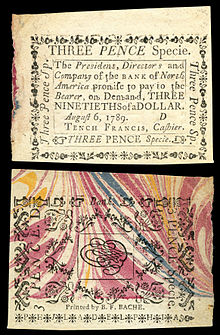Benjamin Franklin Bache
He frequently attacked the Federalist political leaders, including Presidents George Washington and John Adams, and historian Gordon S. Wood wrote that "no editor did more to politicize the press in the 1790s."[1] His paper's heated attacks are thought to have contributed to passage of the Alien and Sedition Acts by the 5th United States Congress and signed by President John Adams in 1798.Perhaps affected by being taken from his family at such a young age, as well as his grandfather's lengthy absences due to his diplomatic work, Bache appeared depressed and shy as an adolescent.By June 1783, Benjamin Franklin was ready to recall his grandson to Paris, where Bache would apprentice as a printer until the two returned to Philadelphia in 1785.His Geneva preparation in Greek and Latin (the core of the college's three-year curriculum) enabled him to graduate in two years, earning his degree in 1787.[8] At the age of 13, he was also learning the classics: he was already interpreting Telemachus, Terence, Sallust, Cicero's Catiline Orations, Lucian, and the New Testament in Greek.[9] Upon returning to Philadelphia, Bache began working as a printer at his grandfather's shop at the family's Franklin Court property on Market Street, presaging his future career as a newspaper editor.His first print job was "An Ode in Imitation of Alcaeus," a poem by the linguistic scholar William Jones, who decried England's corruption and the misuse of monarchical power.[10] Bache's first ventures in commercial publishing were school texts, including Isaiah Thomas’ collection of writings by Aesop and Erasmus.The act of being unselfish made the boy “more glad than if he had eaten ten cakes.”[12] Following his grandfather's death in 1790, Bache inherited Franklin's printing equipment and many of his books.Bache promised, "This paper will always be open, for the discussion of political, or any other interesting subjects, to such as deliver their sentiments with temper and decency, and whose motives appears to be, the public good.[15] After three months, on January 1, 1791, Bache dropped the word “Agricultural” from his paper's title and removed the motto – “Truth, Decency, Utility” – from the nameplate.[17] In November 1794, Bache said that he was renaming his paper to The Aurora and General Advertiser; it was to “diffuse light within the sphere of its influence, dispel the shades of ignorance, and gloom of error and thus tend to strengthen the fair fabric of freedom on its surest foundation, publicity and information.” The name, “Aurora” represented the ascent and accessibility of information promised to its readers.[19] The Aurora was regularly filled with articles attacking what Bache considered to be Washington's monarchical tendencies, his hostile actions toward France, contempt for the public, and his friendly relations with Britain.William Cobbett, known by his pen name Peter Porcupine, described him as a "stubborn sans culotte" and proposed that he be treated "as we would a TURK, a JEW, a JACOBIN or a DOG".[30][31] Duane, who with United Irish émigrés had led protests against the Alien and Sedition Acts, inherited the hostility of Cobbett and Feno.
Benjamin Franklin Bache (surgeon)PhiladelphiaProvince of PennsylvaniaBritish AmericaPennsylvaniaRichard BacheSarah Franklin BacheBenjamin FranklinAmerican journalist, printer and publisherPhiladelphia AuroraJeffersonianFederalistGeorge WashingtonJohn AdamsGordon S. WoodAlien and Sedition Acts5th United States CongressSarah Franklinyellow feverepidemicSarah "Sally" FranklinDeborah ReadFrancis Folger FranklinsmallpoxWilliam FranklinChrist ChurchWilliam Temple FranklinJohn Quincy AdamsFrenchMargaret Hartman MarkoeWilliam DuanePhilibert CramerTelemachusTerenceSallustCiceroCatiline OrationsLucianFranklin Courtapprenticevellum paperErasmusAnna Letitia BarbauldLockeanpolemicalBritishAmerican RevolutionAlexander Hamiltoncorporate interestsJay TreatyWilliam Cobbettpen namesans culotte"USS United StatesJoshua HumphreysJohn FennoSedition Act of 1798common-lawseditious libelChrist Church Burial Groundfreedom of speechFirst AmendmentUnited IrishHartman BacheRichard Bache Jr.A Syllabical and Steganographical tableThe Biographical Dictionary of America